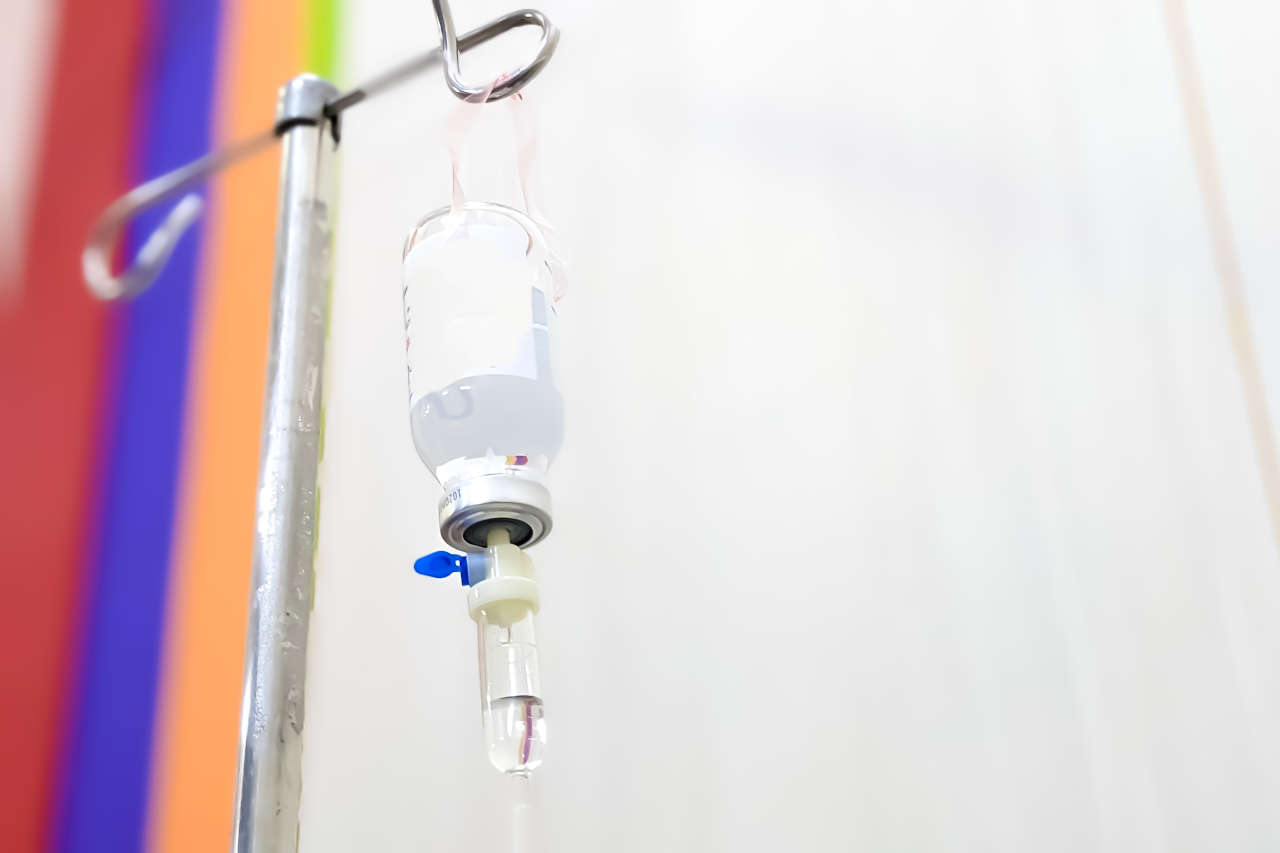
Mặc dù hiếm gặp, các biến chứng của IVIG có thể gây tử vong. Tìm hiểu về các triệu chứng, tỷ lệ mắc bệnh và các yếu tố nguy cơ.
Nhận hỗ trợ đồng thanh toán IVIG – Nói chuyện với chuyên gia
IVIG (globulin miễn dịch tiêm tĩnh mạch) là liệu pháp cứu sống nhiều bệnh tự miễn và viêm. Thuốc thường được dung nạp tốt và hầu hết các tác dụng phụ đều nhẹ, chẳng hạn như đỏ bừng mặt, đau đầu, khó chịu, sốt, ớn lạnh và mệt mỏi.
Tuy nhiên, một số người có thể gặp phải biến chứng nghiêm trọng, tùy thuộc vào từng sản phẩm IVIG cụ thể và sự khác biệt ở từng cá nhân.
Phản vệ
Sốc phản vệ là một phản ứng dị ứng nghiêm trọng, có khả năng đe dọa tính mạng. Trong trường hợp sốc phản vệ, hệ thống miễn dịch sẽ tấn công cơ thể bằng nhiều loại hóa chất, gây tụt huyết áp đột ngột, khó thở và nổi mề đay toàn thân. Các dấu hiệu và triệu chứng khác bao gồm:
- Mạch yếu và nhanh
- Buồn nôn
- Nôn mửa
- Tiêu chảy
- Chóng mặt
- Ngất xỉu
Phản vệ là một trong những biến chứng IVIG hiếm gặp nhất, chỉ có 23 trường hợp được báo cáo trong tài liệu khoa học cho đến năm 2017 [1]. Theo báo cáo, phản vệ nghiêm trọng xảy ra ở khoảng 20 trên 1 triệu ca truyền dịch [2].
Nguy cơ sốc phản vệ có thể cao hơn ở những cá nhân có Thiếu hụt IgA. Hầu hết các phản ứng phản vệ xảy ra ở những người dưới 18 tuổi và trong lần đầu tiên tiêm IVIG.
Hầu hết các sản phẩm IVIG hiện nay đều có hàm lượng IgA rất thấp, giúp giảm thiểu rủi ro.
loạn nhịp tim
Rối loạn nhịp tim (nhịp tim không đều) cũng là một trong những biến chứng hiếm gặp nhất của IVIG và ít được nghiên cứu nhất. Trong rối loạn nhịp tim, tim đập quá chậm, quá nhanh hoặc có nhịp điệu không đều.
Chỉ có một số ít nghiên cứu tìm hiểu về các vấn đề nhịp tim liên quan đến IVIG.
Ví dụ, vào năm 2015, các nhà nghiên cứu Thổ Nhĩ Kỳ đã báo cáo một trường hợp nhịp tim nhanh bất thường trong quá trình truyền IVIG ở hai trẻ sơ sinh [3]. Đây là trường hợp loạn nhịp tim liên quan đến IVIG đầu tiên ở trẻ sơ sinh.
Tuy nhiên, họ không thể thiết lập được mối quan hệ nhân quả và kết luận rằng đó có thể là sự trùng hợp ngẫu nhiên.
Tương tự như vậy, một cuộc điều tra năm 2023 đã phát hiện ra tỷ lệ ngừng tim và nhịp tim nhanh không đều cao hơn ở những người được truyền IVIG [4]. Ngừng tim là tình trạng cấp cứu y tế khi tim bạn đột nhiên ngừng đập.
Mặc dù hầu hết các trường hợp chỉ là tạm thời, nhưng rối loạn nhịp tim có thể gây tử vong.
Bác sĩ có thể sẽ đề nghị theo dõi tim trong quá trình truyền dịch, đặc biệt nếu bạn có tiền sử rối loạn tim.
Suy thận cấp

Suy thận cấp hay tổn thương thận cấp (AKI) là tình trạng mất chức năng thận nhanh chóng. Kết quả là các chất thải tích tụ trong máu. Các triệu chứng của AKI bao gồm:
- Giảm lượng nước tiểu
- Sưng ở chân, mắt cá chân hoặc bàn chân
- Hụt hơi
- Mệt mỏi
- Nhịp tim không đều
- Đau hoặc tức ngực
Tổn thương thận nghiêm trọng có thể dẫn đến co giật, hôn mê hoặc tử vong.
Các triệu chứng thường xuất hiện trong vòng 10 ngày đầu sau khi bắt đầu IVIG và thường có thể hồi phục. Tuy nhiên, có thể cần phải chạy thận nhân tạo tạm thời trong khoảng 301 trường hợp.
AKI liên quan đến IVIG là một biến chứng IVIG phổ biến nhưng hiếm gặp. Tỷ lệ mắc bệnh chính xác chưa được biết rõ nhưng được cho là ảnh hưởng đến ít hơn 1% ở tất cả những người được điều trị bằng IVIG [5].
Nguyên nhân gây tổn thương thận của IVIG vẫn đang được nghiên cứu. Tuy nhiên, các yếu tố sau đây có thể làm tăng nguy cơ:
- Tuổi cao (65 tuổi trở lên)
- Bệnh tiểu đường
- Sử dụng đồng thời các loại thuốc gây tổn thương thận (thuốc gây độc thận)
- Sản phẩm có chứa sucrose hoặc mannitol
- Tiền sử bệnh thận
- Truyền dịch nhanh, liều cao
Nếu bạn thuộc nhóm nguy cơ cao, bác sĩ sẽ kiểm tra chức năng thận của bạn trước mỗi lần truyền IVIG. Họ cũng có thể giảm liều hoặc tốc độ truyền, yêu cầu bạn ngừng dùng thuốc gây độc thận hoặc chuyển sang tiêm globulin miễn dịch dưới da (SCIG).
Thông tin điều trị | Nhận được sự cho phép trước của IVIG
Tổn thương phổi cấp tính liên quan đến truyền máu (TRALI)
Biến chứng phổi cấp tính (TRALI) liên quan đến IVIG là một biến chứng nghiêm trọng và có khả năng gây tử vong do IVIG. Nó được định nghĩa là tổn thương phổi cấp tính (ALI) mới phát triển trong hoặc trong vòng 6 giờ sau khi truyền.
Các triệu chứng bao gồm:
- Thở nhanh
- Hụt hơi
- Sốt
- Huyết áp thấp
- Nhịp tim nhanh
Tỷ lệ mắc bệnh IVIG TRALI chính xác vẫn chưa được biết rõ, có thể là do báo cáo không đầy đủ và chẩn đoán sai.
Tương tự như vậy, cách IVIG gây ra TRALI vẫn chưa rõ ràng. Tuy nhiên, các báo cáo ca bệnh cho thấy việc truyền dịch nhanh, liều cao có thể làm tăng nguy cơ [6].
Điều trị chủ yếu là hỗ trợ và bao gồm các biện pháp đảm bảo hô hấp và cân bằng dịch thích hợp.
Viêm màng não vô khuẩn
Viêm màng não vô khuẩn là một biến chứng hiếm gặp nhưng đáng kể do IVIG. Trong viêm màng não do IVIG, màng não bao quanh não và tủy sống (màng não) bị viêm.
Các đặc điểm chính của viêm màng não do IVIG gây ra là:
- Đau đầu
- Cứng/đau cổ
- Độ nhạy sáng cực độ (sợ ánh sáng)
Hầu hết các trường hợp được báo cáo trong lần truyền đầu tiên. Các nghiên cứu cho thấy cứ 10.000 lần truyền thì có gần 7 trường hợp viêm màng não.
Cơ chế gây viêm màng não do IVIG vẫn chưa được hiểu rõ.
Các chuyên gia y tế tin rằng màng não có thể bị viêm do tác dụng độc hại trực tiếp của immunoglobulin hoặc phản ứng quá mẫn do các thành phần khác trong sản phẩm gây ra. Truyền dịch nhanh, liều cao, mất nước và phụ nữ mang thai có thể làm tăng nguy cơ.
Mặc dù có khả năng biến chứng nghiêm trọng, Viêm màng não do IVIG gây ra không có khả năng gây tử vong [7].
TÀI LIỆU THAM KHẢO:
- Williams, Sharon Julie và Sudhir Gupta. “Sốc phản vệ với IVIG.” Archivum immunologiae et therapiae Experimentis vol. 65,1 (2017): 19-11. doi:10.1007/s00005-016-0410-1
- Martinez, Carlos và cộng sự. “Immunoglobulin tiêm tĩnh mạch và nguy cơ hiện tại của các biến cố phản vệ vừa và nặng, một nghiên cứu đoàn hệ.” Miễn dịch học lâm sàng và thực nghiệm tập 206,3 (2021): 384-394. doi:10.1111/cei.13665
- Tufekci, Sinan và cộng sự. “Những bất thường về nhịp tim trong quá trình truyền tĩnh mạch immunoglobulin G (IVIG) ở hai trẻ sơ sinh: sự trùng hợp hay liên quan?” Báo cáo ca lâm sàng tập 3,9 (2015): 731-4. doi:10.1002/ccr3.329
- Melhem, Racha Abi, và cộng sự. “Di chứng tim mạch do truyền Immunoglobulin tĩnh mạch.” Tạp chí Dị ứng và Miễn dịch Lâm sàng, tập 151, số 2, tháng 2 năm 2023, trang AB330. https://doi.org/10.1016/j.jaci.2022.12.765.
- Orquera, José David và cộng sự. “Tổn thương thận cấp tính nghiêm trọng do truyền immunoglobulin ở bệnh nhân hội chứng Guillain-Barré đe dọa tính mạng.” Bản tin cấp cứu và chấn thương tập 10,1 (2022): 44-48. doi:10.30476/BEAT.2021.85702.1103
- Ray, Sanghamitra và cộng sự. “Tổn thương phổi cấp tính liên quan đến truyền máu do quá liều IVIG do thầy thuốc gây ra ở hội chứng Guillain-Barré.” Tạp chí khoa học thần kinh nhi khoa tập 14,3 (2019): 140-142. doi:10.4103/jpn.JPN_47_19
- Kretowska-Grunwald, Anna và cộng sự. “Viêm màng não vô trùng do immunoglobulin tiêm tĩnh mạch - Tổng quan về quá trình chẩn đoán, cơ chế bệnh sinh, biện pháp phòng ngừa và điều trị.” Tạp chí Y học Lâm sàng, tập 11, 13, trang 3571. Ngày 21 tháng 6 năm 2022, doi:10.3390/jcm11133571













